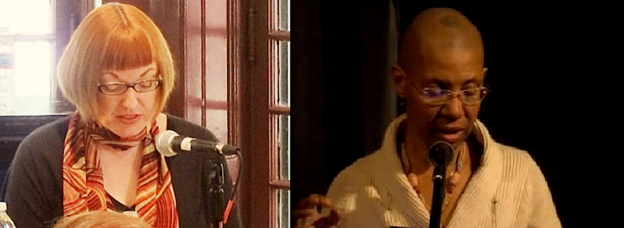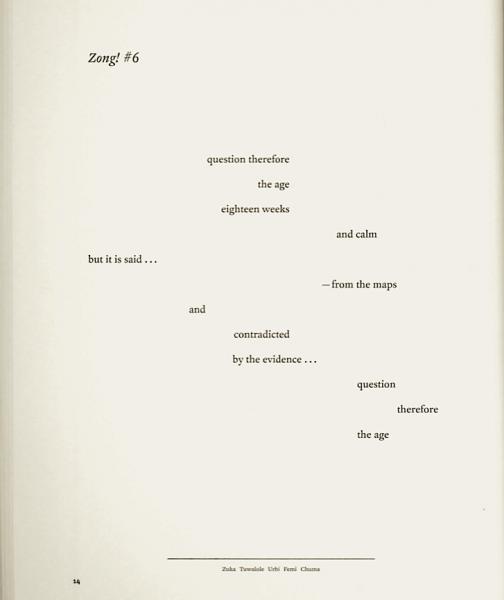
First reading of M. NourbeSe Philip's 'Zong!' #6 (3)
Kathy Lou Schultz

I first read M. NourbeSe Philip’s Zong! #6 within the context of her book-length work, Zong!, which I had ordered after hearing about it from several friends who had attended, or participated in, performances of the work while it was still in progress. I approached the book with a feeling that this poem was crucial and I needed to catch up with what my friends had experienced. I also longed for my poetry communities in San Francisco and Philadelphia, where I had at times attended multiple poetry readings within the space of one week. I felt an increased sense of urgency indicated by the capital letters and exclamation point on the book’s cover: ZONG!
My most recent scholarship focuses on what I term the Afro-Modernist epic. I have found that understanding the contextual framing of these long works is essential to reading any of their individual parts, and the poem text of Zong! is surrounded by numerous frames. These include: multiple dedications, epigraphs, and acknowledgements; a glossary; “Manifest”; and “Notanda” (Philip’s account of writing the poem); and, finally, the legal decision Gregson v. Gilbert from which we know the story of the slave ship Zong whose crew, in a calculated attempt to collect insurance money, threw African captives overboard while they were still alive.
It is from this legal case that Philip constructs her epic. As a lawyer and a poet, she has both a fascination with, and deep distrust for, the ability of words to make meaning. Thus her repeated claim, “There is no telling this story; it must be told.” The poem teeters between legal language and poetry, and the ways in which either may evacuate or imbed meaning, history, and emotion.
Philip also makes a haunting assertion that she acted as amanuensis. The poem recorded in this book is “As told to the author by Setaey Adamu Boateng.” The spine of my Wesleyan paperback edition even lists both “Philip & Boateng” as the authors. Thus, Philip animates the voices of the ancestors through the writing of this poem.
As I page through the book, my eye is drawn to Philip’s use of the page — the manner in which the words collect, then disperse; how they constellate at points like waves; or dissolve into individual syllables and letters. The poem reaches for breath, for sense.
Water is an enemy in the poem: the calm seas that do not push the ship forward to its destination, the dwindling supply of fresh water for drinking, the expansive sea that consumes the Africans forcibly thrown overboard, never to resurface.
I am so entranced by this movement of words, that I nearly miss the footer running along the bottom of the page: “Zuka Tuwalole Femi Chuma,” a role call of names. The entire series, Zong! #1–26, is built upon a foundation of names, a monument for the dead.
Zong! #6 is a series of questions, assertions, and contradictions. The first three lines (centered on the page, though aligned by the imagined right, not left, margin) suggest a body: “question therefore / the age / eighteen weeks.” The “age” (and not “duration” or “length”) evokes the image of an infant (age, eighteen weeks). Our habit is to describe a baby’s age in weeks, before we realize we can begin giving the age in months: four months, five months … Yet, this child is rendered to body only: it is neither “he” nor “she.” A sense of doom rises in my belly.
Other assertions and then contradictions follow: “but it is said …” “and / contradicted / by the evidence …” “— from the maps” showing a ship off course, out of time, outside of time. A journey estimated at forty days now gone eighteen weeks. Unable to correctly interpret the “evidence” of the map, does “the age” of the infant body indicate space and time? (An infant born on ship?) The body. The body of evidence. Contradicted.
Because Philip constructed the poem from legal language that renders the human body visible only through an insurance case that determines its monetary value, she plays with the inherently contradictory moral logic until it implodes, revealing itself to history.
It is through the series of framing devices that I am led further and deeper into the words on the page of Zong! #6 — even as they threaten to pull apart.

Kathy Lou Schultz is the author of four collections of poems, most recently Biting Midge: Works in Prose (Belladona) and Some Vague Wife (Atelos). Her monograph, The Afro-Modernist Epic and Literary History: Tolson, Hughes, Baraka, is part of the Modern and Contemporary Poetry and Poetics Series from Palgrave. Schultz’s articles have appeared in a wide variety of scholarly journals including Contemporary Literature, Journal of Modern Literature, and Jacket2. She is an associate professor of English at the University of Memphis, where she directs the English Honors Program and teaches courses in African American and Afro-Diasporic literature, poetry and poetics, and modernism.